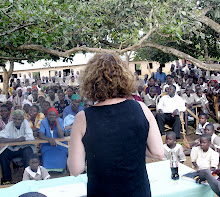
I drove down to Cape Charles on Friday. Cape Charles is an old railroad town on the Chesapeake Bay. Its homes are neatly stacked next to each other, shining pinks and greens, wide verandas with old wicker rocking chairs. The nights are sultry and soft.
It was while driving through the farmland on the way down, that I found myself caught in thoughts about here and Kenya. When I come home from Kenya, since I live in the city, while it’s difficult to adjust, there is little similarity to disarm me, so it’s not too bad. Driving on the smooth, straight roads, flat and wide I found myself startled by the rows of crops. Cornfields stretched along side of me, clipped and watered by a system that hung overhead. Next to the corn was what looked like my old friend millet and soy. Crops are rotated, fed well and watered. Next to most farms stood a large building with a circular roof. I remembered them well from my childhood. Silos! Silos hold the harvested grain, keeping it from rotting and allowing it to be sold at the best times. Those farms, which don’t have silos, have the convenience of either having a shared one with a neighbor or one less than a mile away at a crossroad or a small town.
What a vast difference from what I see in Kenya. It is not that the rows of corn are messy, just a bit haphazard. Dust from the unpaved roads blows over it willy-nilly. There is no irrigation system, so the stalks open their mouths to the sky hoping for a drink of water, or bend down with rot when too much water beats them into the ground. When farmers harvest the crop they must take it right to market. There are no well-kept farms with silos to hold the crops; in fact there are no grain storage facilities for miles and miles. It is almost impossible for a farmer to get it to a silo and so the grain must be sold immediately or they risk the probability of rot.
As I drove along I also saw livestock. Goats frolicked on verdant grass, kept safe by clean white fences. These were not the exhausted goats I saw on the roads or in the towns of Nambale, Kisi, or Busia. Chickens were kept in gynormous air-conditioned coops, out of the sun and resting until their ultimate demise. No working for living for these animals
It set my mind to thinking about so many things. The abundance of facilities and mechanisms we have to make farming easier was everywhere. What it would mean to a farmer in Africa to have a watering system which would help him tame one of the elements. It would literally change his world. But even more than that, a silo to store the grain in each village would allow the farmers a cooperative and a way of helping them climb out of poverty.
As a child a silo was a magical place where I would watch them pour the grain from a long shoot into the top of the roof. You always fill from the bottom up. The smell around them was warm with the scent of the wheat or the corn. I would stand there with my father and watch them fill. He would always warn me that they were dangerous places as well, since if you fell into one, you could literally drown in the grain. Now they take on a totally different meaning for me. Now I know that silos would mean a new beginning for the farmers of Nambale, a new way of life and as I slide down to road toward Cape Charles I wonder how we could make that happen.
Tuesday, August 4, 2009
Silos
Labels:
KenyaFarmingEmpowerment
Subscribe to:
Post Comments (Atom)




No comments:
Post a Comment